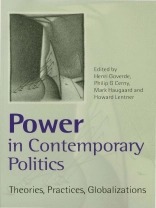This major book provides an up-to-date and state-of-the-art overview of the contemporary theory and practice of the most central concept in political science: power.
The concept of political power is introduced within a three-part framework: contemporary theories of power; applications of power processes and practices; and the implications of modern power flows across the globe today.
The book explores the many structures of power in the contemporary world from theories of its construction and use, to its operation in policy networks, and its wider exercise at different levels in the political process, from the local to the global.
Amongst the many themes explored are the reproduction and the legitimization of power, the dynamics of resistance and coercion, the concepts of private and public power, and the impact of globalization processes and subsequent shifting power arrangements.
Combining diverse perspectives and different tools of analysis, this book represents the most comprehensive treatment of political power published in the last fifteen years. It will be essential reading for academics and students alike across political science, international studies and political sociology.
Tabela de Conteúdo
Introduction
PART ONE: THEORIES
Introduction to Part I – Mark Haugaard
Constitution and Use of Power – Gerhard Goehler
Consent and Legitimacy – Mark Haugaard
Coercion, Resistance and Legitimacy – Stewart Clegg
PRACTICES
Introduction to Part II – Henri Goverde
Power and Policy Networks – Henri Goverde and Jan van Tatenhove
Private and Public Power at the National Level – Hilmar Rommetvedt
Political Influence of NGOs on International Environmental Issues – Bas Arts
PART THREE: GLOBALIZATIONS
Introduction to Part III – Philip G Cerny
Globalization as Americanization – Erkki Berndtson
Globalization and the Disarticulation of Power – Philip G Cerny
Towards a New Middle Ages?
Politics, Power and States in Globalization – Howard H Lentner












